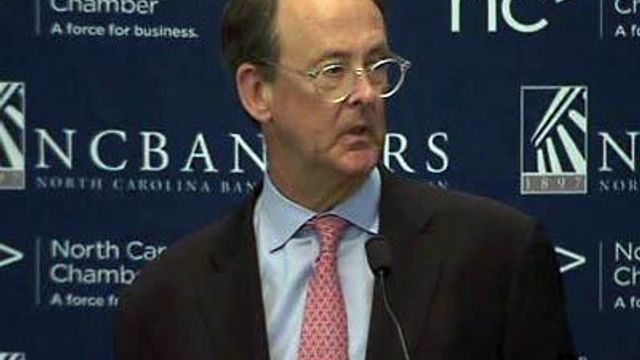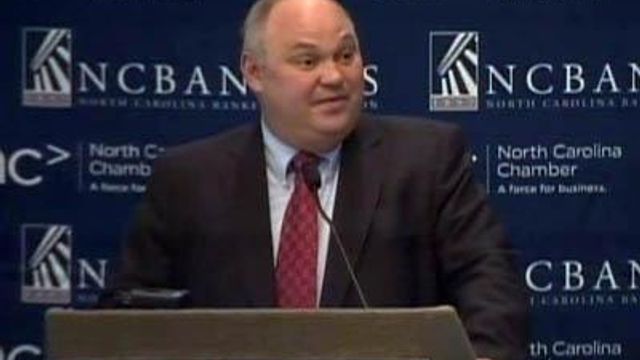NC business leaders get dire forecast for 2011 economy
North Carolina business leaders heard Monday from lawmakers, an economist and others about the grim picture for the state and national economies in the coming year.
Posted — UpdatedFormer University of North Carolina President Erskine Bowles, who recently chaired a commission appointed by President Barack Obama to find ways to cut the federal deficit, said the country is in "abysmal" financial shape.
National debt is now almost $14 trillion, and Bowles said all tax revenue covers only mandatory spending like Social Security, Medicare and Medicaid. The money to pay for defense, homeland security, education, research and infrastructure is borrowed, he said, calling it a "formula for failure."
"That debt is like a cancer, and it is truly going to destroy our country from within," Bowles told the estimated 1,000 people who attended the ninth annual Economic Forecast Forum sponsored by the North Carolina Chamber and the North Carolina Bankers Association.
"When it happens, it's going to happen so quickly that it's going to catch us by surprise," Bowles said. "The problm is real, the solutions are painful, and there's no easy way out."
If no action is taken, he predicted, the U.S. will be paying $1 trillion a year in interest on the national debt.
Wells Fargo economist Mark Vitner was more optimistic in his assessment, calling for a slow economic recovery. People have yet to feel any change in their lives since the statistical end of the so-called Great Recession 18 months ago, he said.
Vitner predicted that the national unemployment rate will remain above 6 percent for the next decade.
State Budget Director Charlie Perusse, Sen. Peter Brunstetter, R-Forsyth, and Rep. Harold Brubaker, R-Randolph, provided an overview of the state budget picture during the forum.
The lawmakers and Perusse, who helps Gov. Beverly Perdue prepare her proposed budget, said the 2011-12 state budget would include $3.7 billion in cuts to erase a growing deficit. No new taxes would be included to close the budget gap, they said.
"I would prefer to make changes like we're going to have to make over a multi-year period and phase things in to avoid the shock waves through the system," said Brunstetter, one of three GOP senators designated as the next co-chairmen of the Senate budget-writing committee. "It's just I don't think that's the current economic environment we're in.
"We have, for whatever reason, put decisions off year to year," he said. "The stimulus package was a blessing and a curse in that regard because it helped us get through last year. On the other hand, it's going to make the mountain we have to climb that much bigger this year."
Republican leaders have been meeting together and with Perdue to discuss possibilities. Perdue already has rolled out the structure of a government reorganization plan she said should save hundreds of millions of dollars. She's also ordered state agencies to hold back up to 3.5 percent of their spending to save at least another $400 million that can be used to close next year's gap, Perusse said.
"It is incumbent upon all of us to have a budget that is structurally sound," he said. "We know that we've got a tough couple of years ahead of us."
Rep. Jim Crawford, D-Granville, who was a senior budget writer for the past decade, said he supports extending $1.3 billion in sales and income taxes set to expire this year to lessen the need for drastic cuts.
"If they insist on cutting the entire $4 billion, there will be deep pain and suffering," Crawford said after attending the forum. "To keep those jobs and to keep from hurting the economy more, we're better off to pay a small amount of tax."
Brubaker said he expects increased use of "zero-based budgeting," through which state programs will have to justify their existence. It's been a favorite idea of Republicans, and Brubaker said across-the-board cuts aren't as feasible after budget reductions in 2009 and 2010 and don't root out inefficient or wasteful programs.
"We have to rethink the purpose of state government," he said.
Privatizing more government services, trimming non-mandatory Medicaid services and finding more government waste and fraud were mentioned as possible savings options.
"There's really no sacred cows at this point," Brunstetter said.
These and other changes will affect the state government work force, Brunstetter said, but it's unclear right now exactly how. Perdue has said layoffs are likely.
Bowles said balancing the federal budget will require a mix of growth, cuts and tax increases, but he said the General Assembly should be able to handle its deficit through cuts alone.
• Credits
Copyright 2024 by WRAL.com and the Associated Press. All rights reserved. This material may not be published, broadcast, rewritten or redistributed.






